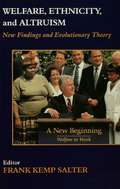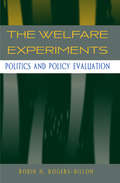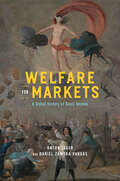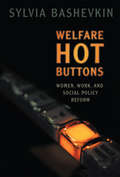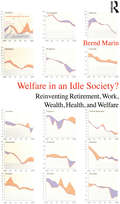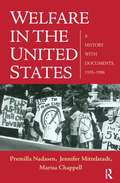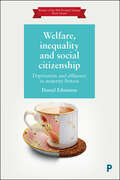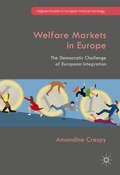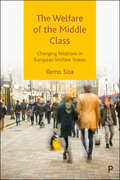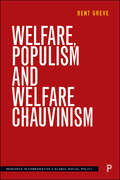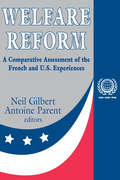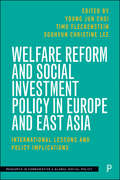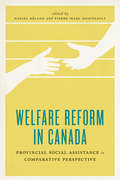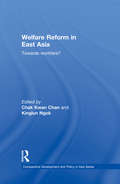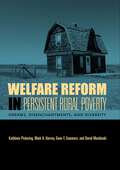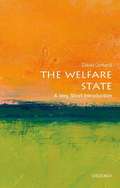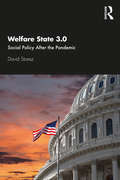- Table View
- List View
Welfare Economics and Antitrust Policy - Vol. I: Economic, Moral, and Legal Concepts and Oligopolistic and Predatory Conduct
by Richard S. MarkovitsThis book is Volume I of a two-volume set on antitrust policy, analyzing the economic efficiency and moral desirability of various tests for antitrust legality, including those promulgated by US and EU antitrust law. The overall study consists of three parts. Part I (Chapters 1-8) introduces readers to the economic, moral, and legal concepts that play important roles in antitrust-policy analysis. Part II (Chapters 9-16) analyzes the impacts of eight types of conduct covered by antitrust policy and various possible government responses to such conduct in terms of economic efficiency, the securing of liberal moral rights, and the instantiation of various utilitarian, non-utilitarian-egalitarian, and mixed conceptions of the moral good. Part III (Chapters 17-18) provides detailed information on US antitrust law and EU competition law, and compares the extent to which—when correctly interpreted and applied—these two bodies of law could ensure economic efficiency, protect liberal moral rights, and instantiate various morally defensible conceptions of the moral good. This first volume contains Part I and the first two chapters of Part II of the overall study—the two chapters that focus on oligopolistic and predatory conduct of all kinds, respectively. The book will appeal to undergraduate and graduate students of economics and law who are interested in welfare economics, antitrust legality and the General Theory of the Second Best.
Welfare Economics and Second-Best Theory: A Distortion-Analysis Protocol for Economic-Efficiency Prediction
by Richard S. MarkovitsThis book examines the implications of The General Theory of Second Best for analyzing the economic efficiency of non-government conduct or government policies in an economically efficient way. It develops and legitimates an economically efficient economic-efficiency-analysis protocol with three unique characteristics: First, the protocol focuses separately on each of a wide variety of categories of economic inefficiency, many of which conventional analyses ignore. Second, it analyzes the impact of conduct or policies on each of these categories of economic inefficiency, primarily by predicting the respective conduct’s/policy’s impact on the distortion that the economy’s various Pareto imperfections generate in the profits yielded by the resource allocations associated with the individual categories of economic inefficiency—i.e., on the difference between their profitability and economic efficiency. And third, it is third-best—i.e., it instructs the analyst to execute a theoretical or empirical research project if and only if the economic-efficiency gains the project is expected to generate by increasing the accuracy of economic-efficiency conclusions exceed the predicted allocative cost of its execution and public financing. The book also uses the protocol to analyze the economic efficiency of specific policies so as to illustrate both how it differs from the protocols that most applied welfare economists continue to use and how its conclusions differ from those produced by standard analysis.
Welfare, Ethnicity and Altruism: New Data and Evolutionary Theory (Routledge Studies in Nationalism and Ethnicity)
by Frank SalterWelfare, Ethnicity, and Altruism applies the controversial theory of 'Ethnic Nepotism', first formulated by Irenäus Eibl-Eibesfeldt and Pierre van den Berghe, to the modern welfare state (both are authors in this volume). This theory states that ethnic groups resemble large families whose members are prone to cooperate due to 'kin altruism'. Recent empirical findings in economics and political science offer confirmatory evidence. The book presents two separate studies that compare welfare expenditures around the world, both indicating that the more ethnically mixed a population becomes, the greater is its resistance to redistributive policies. These results point to profound inconsistencies within ideologies of both left and right regarding ethnicity.
The Welfare Experiments: Politics and Policy Evaluation
by Robin H. Rogers-DillonWelfare experiments conducted at the state level during the 1990s radically restructured the American welfare state and have played a critical—and unexpected—role in the broader policymaking process. Through these experiments, previously unpopular reform ideas, such as welfare time limits, gained wide and enthusiastic support. Ultimately, the institutional legacy of the old welfare system was broken, new ideas took hold, and the welfare experiments generated a new institutional channel in policymaking. In this book, Rogers-Dillon argues that these welfare experiments were not simply scientific experiments, as their supporters frequently contend, but a powerful political tool that created a framework within which few could argue successfully against the welfare policy changes. Legislation proposed in 2002 formalized this channel of policymaking, permitting the executive, as opposed to legislative, branches of federal and state governments to renegotiate social policies—an unprecedented change in American policymaking. This book provides unique insight into how social policy is made in the United States, and how that process is changing.
The Welfare Experiments
by Robin Rogers-DillonWelfare experiments conducted at the state level during the 1990s radically restructured the American welfare state and have played a critical--and unexpected--role in the broader policymaking process. Through these experiments, previously unpopular reform ideas, such as welfare time limits, gained wide and enthusiastic support. Ultimately, the institutional legacy of the old welfare system was broken, new ideas took hold, and the welfare experiments generated a new institutional channel in policymaking. In this book, Rogers-Dillon argues that these welfare experiments were not simply scientific experiments, as their supporters frequently contend, but a powerful political tool that created a framework within which few could argue successfully against the welfare policy changes. Legislation proposed in 2002 formalized this channel of policymaking, permitting the executive, as opposed to legislative, branches of federal and state governments to renegotiate social policies--an unprecedented change in American policymaking. This book provides unique insight into how social policy is made in the United States, and how that process is changing.
Welfare for Markets: A Global History of Basic Income (The Life of Ideas)
by Anton JägerA sweeping intellectual history of the welfare state’s policy-in-waiting. The idea of a government paying its citizens to keep them out of poverty—now known as basic income—is hardly new. Often dated as far back as ancient Rome, basic income’s modern conception truly emerged in the late nineteenth century. Yet as one of today’s most controversial proposals, it draws supporters from across the political spectrum.In this eye-opening work, Anton Jäger and Daniel Zamora Vargas trace basic income from its rise in American and British policy debates following periods of economic tumult to its modern relationship with technopopulist figures in Silicon Valley. They chronicle how the idea first arose in the United States and Europe as a market-friendly alternative to the postwar welfare state and how interest in the policy has grown in the wake of the 2008 credit crisis and COVID-19 crash.An incisive, comprehensive history, Welfare for Markets tells the story of how a fringe idea conceived in economics seminars went global, revealing the most significant shift in political culture since the end of the Cold War.
Welfare For The Rich: How Your Tax Dollars End Up In Millionaires' Pockets--and What You Can Do About It
by Phil Harvey Lisa Conyers David BoazIn today’s ultra-polarized and highly partisan political environment, Welfare for the Rich is one of the rare books written to appeal to engaged and open-minded citizens from across the political spectrum. Welfare for the Rich is the first book to describe and analyze the many ways that federal and state governments provide handouts—subsidies, grants, tax credits, loan guarantees, price supports, and many other payouts—to millionaires, billionaires, and the companies they own and run. Many journalists, scholars, and activists have focused on one or more of these dysfunctional programs. A few of the most egregious examples have even become famous. But Welfare for the Rich is the first attempt to paint a comprehensive, easily accessible picture of a system largely designed by the richest Americans—through lobbyists, lawyers, political action committees, special interest groups, and other powerful influencers—with the specific goal of making sure the government keeps wealth and power flowing from the many to the few.
Welfare for the Wealthy
by Christopher G. FaricyHow does political party control determine changes to social policy, and by extension, influence inequality in America? Conventional theories show that Democratic control of the federal government produces more social expenditures and less inequality. Welfare for the Wealthy re-examines this relationship by evaluating how political party power results in changes to both public social spending and subsidies for private welfare - and how a trade-off between the two, in turn, affects income inequality. Christopher Faricy finds that both Democrats and Republicans have increased social spending over the last forty-two years. And while both political parties increase federal social spending, Democrats and Republicans differ in how they spend federal money, which socioeconomic groups benefit, and the resulting consequences for income inequality.
Welfare Hot Buttons: Women, Work, and Social Policy Reform
by Sylvia BashevkinWelfare Hot Buttons provides one of the first comparative assessments of contemporary social policy change in three Western countries: Canada, the United States, and Great Britain. Sylvia Bashevkin probes the fate of single mothers on social assistance during the period when three "third way" political executives were in office – Bill Clinton (US), Jean Chrétien (Canada), and Tony Blair (Great Britain) – and argues that despite seemingly progressive campaign rhetoric, the social assistance policy realities under each of these three leaders were in crucial respects more punitive and restrictive than those of their neo-conservative predecessors in the 1980s. Bashevkin addresses even more contentious issues in her study, including the question of whether Anglo-American welfare states are being eclipsed by what she views as newly emergent duty states. In her comparative approach and in her substantive analysis, Bashevkin makes an original and critical contribution to the existing body of literature on social policy.
Welfare in an Idle Society?: Reinventing Retirement, Work, Wealth, Health and Welfare
by Bernd MarinThe modern welfare state is indeed one of the greatest achievements of the post-war 20th century. With its key aims of eradicating the five giant social ills of Want, Ignorance, Disease, Squalor and Idleness, it aimed to providing a minimum standard of living, with all people of working age paying a weekly contribution; in return, benefits would be paid to anyone who was sick, unemployed, retired or widowed. The modern welfare state, therefore, is about maintaining a delicate equilibrium between dependent social groups on the one hand and the active working classes on the other. In the case of old-age security, this balance is being achieved (or not) by the so-called Generation Contract. This social pact is more of an implicit, unwritten and unspecified social contract. This ground-breaking book demonstrates how countries are addressing population-ageing challenges in depth, using the case study of Austria to gain the required complexity and differentiation in a comparative European framework of empirical evidence. This is a broad social science study in political economy and sociology, not an economic analysis. Though focusing on pensions, it centres on the (im)balance between work and non-work, issues of health, work ability, employability, and benefit receipt from old-age security to disability allowance. It will be required reading for all sociologists and social policy experts and academics working within this area.
Welfare in the United States: A History with Documents, 1935-1996
by Premilla Nadasen Jennifer Mittelstadt Marisa ChappellWelfare has been central to a number of significant political debates in modern America:<p><p> - What role should the government play in alleviating poverty?<br> - What does a government owe its citizens, and who is entitled to help?<br> - How have race and gender shaped economic opportunities and outcomes?<br> - How should Americans respond to increasing rates of single parenthood?<br> - How have poor women sought to shape their own lives and influence government policies? <p> With a comprehensive introduction and a well-chosen collection of primary documents, Welfare in the United States chronicles the major turning points in the seventy-year history of Aid to Families with Dependent Children (AFDC). Illuminating policy debates, shifting demographics, institutional change, and the impact of social movements, this book serves as an essential guide to the history of the nation's most controversial welfare program.
Welfare, Inequality and Social Citizenship: Deprivation and Affluence in Austerity Britain
by Daniel EdmistonExploring the lived realities of both poverty and prosperity in the UK, this book examines the material and symbolic significance of welfare austerity and its implications for social citizenship and inequality. The book offers a rare and vivid insight into the everyday lives, attitudes and behaviours of the rich as well as the poor, demonstrating how those marginalised and validated by the existing welfare system make sense of the prevailing socio-political settlement and their own position within it. Through the testimonies of both affluent and deprived citizens, the book problematises dominant policy thinking surrounding the functions and limits of welfare, examining the civic attitudes and engagements of the rich and the poor, to demonstrate how welfare austerity and rising structural inequalities secure and maintain institutional legitimacy. The book offers a timely contribution to academic and policy debates pertaining to citizenship, welfare reform and inequality.
Welfare Markets in Europe
by Amandine CrespyThis book explores theEuropean welfare model, arguing that the rollout of European policiesfor welfare services has led to increased marketization. The author argues thatthe rise of profit-making in utilities, transport, child and health care isexacerbating rather than reducing inequalities among citizens, demonstratinghow the marketization of European welfare has taken place oversuccessive rounds of policymaking for European integration. These rounds have motivatednational level public services reform, as well as contestation over thesemeasures from civil society groups. The study traces the developments ofpolicymaking at EU level since the late 1980s, offers in-depth studies ofcontentious debates which have sealed the fate of welfare services at the turnof the century, and offers insights on the problems involved with prolongedausterity in Europe. This book therefore shows how European integration isprovoking a democratic challenge to what kind of Europe citizens want.
The Welfare of the Middle Class: Changing Relations in European Welfare States
by Remo SizaIn many European countries, processes of individualisation have contributed to transforming the middle class into a multitude of people, a sort of ‘middle mass’ with an unstable social identity and radical activism. The different ‘worlds’ of European welfare states seem progressively less able to manage this new kind of middle-class activism. This book is an essential contribution to ongoing public and academic debates on the unpredictability of middle-class attitudes and on their changing relations with the welfare state. Identifying key trends in the literature, it considers the impact of recent welfare reforms on the needs and preferences of the middle class.
Welfare Politics in Mexico: Papering Over the Cracks (Routledge Revivals)
by Peter WardWhen it was originally published in 1986, this was the first book to deal simultaneously with several aspects of social welfare provision in a developing country. The unique contribution of the book is based on the analysis of 3 substantive welfare areas – land (for self-help housing), urban infrastructure and health – which are examined in terms of the nature, motivation and effectiveness of government intervention. The book covers 3 administrations between 1970 and the mid-1980s and sets the analysis in the wider context of Latin American affairs. The author shows that although social welfare expenditure has increased, its importance as a government priority has been sharply eroded.
Welfare, Populism and Welfare Chauvinism (Research in Comparative and Global Social Policy)
by Bent GreveIn the wake of the financial crisis, and with increasing numbers of people in precarious and low paid jobs, there has been a surprising surge of support for populist right-wing political parties who often promote an anti-welfare message. Tougher approaches and welfare chauvinism are on the agenda in many countries, with policies which reduce the welfare state for those seen as undeserving and changes that often disproportionally benefit the rich. Why are voters seemingly not concerned about growing inequality? Using a mixed-methods approach and newly released data, this book aims to answer this question and to show possible ways forward for welfare states.
Welfare Reform: A Comparative Assessment of the French and U. S. Experiences (International Social Security Ser. #Vol. 10)
by Rosemary A. StevensSince the late 1980s welfare policies in France and the United States have increasingly been shaped by a strong emphasis on citizens' obligations to work and be independent, and a weakening of entitlements to income maintenance. Throughout the advanced industrialized nations, welfare reforms incorporate work-oriented measures such as financial incentives, insertion contracts, training, and requirements to search for and accept jobs. The evidence in this volume suggests that while the details may vary, welfare reforms in France and the United States have more in common than is often acknowledged. Welfare Reform provides an in-depth analysis of the development and structure of modern welfare programs and how they function. The dynamics of welfare reform are illuminated by focusing on two programs: the Revenu Minimum d'Insertion in France and Temporary Assistance for Needy Families in the United States. Taking various analytic approaches, contributors examine the relations between poverty and work, how U.S. and French models of income support have been transformed in recent times, the relative impacts of economic growth and policy reforms on rates of welfare participation, and what happens to recipients who leave the welfare rolls. Welfare Reform will help researchers and policymakers gain perspective on where they are headed and how best to get there as they journey down the highway of welfare reform. Neil Gilbert is Chernin Professor of Social Welfare at the School of Social Welfare, University of California at Berkeley, and co-director of the Center for Child and Youth Policy (CCYP). His numerous publications include 25 books and over 100 articles that have appeared in The Public Interest, Society, Commentary, and other leading academic journals. Antoine Parent is associate professor of economics at the University of Paris 8, associate researcher at MATISSE, University of Paris 1--Sorbonne, and research program manager at the Research Division of the French Ministry of Social Affairs.
Welfare Reform and Social Investment Policy: International Lessons and Policy Implications (Research in Comparative and Global Social Policy)
by Young Jun Choi, Timo Fleckenstein & Soohyun Christine LeeSocial investment policies have enjoyed prominence during recent welfare reforms across the OECD world, and yet there is insufficient long-term strategy for their success. Reviewing labour market, family and education policies, this edited collection analyses the emergence of social investment policies in both Europe and East Asia. Adopting a life course perspective and examining both public and private investments, this book addresses key contemporary policy issues including care, learning, work, social mobility and inequalities. Providing original observations, this seminal text explores the roads and barriers towards effective social investment policies, derives practical social policy implications and highlights important lessons for future policymaking.
Welfare Reform in California
by Amy G. Cox Donna O. Farley Elaine Reardon Joe Hotz Jacob Alex KlermanExamines the effects of the California Work Opportunity and Responsibility to Kids (CalWORKs) program on work activity participation rates of welfare recipients, welfare caseloads, and outcomes for welfare leavers. While the CalWORKs reforms appear to have been responsible for some of the uniform improvement in outcomes shown by the analysis, the robust economy and other policy changes were probably also important.
Welfare Reform in Canada: Provincial Social Assistance In Comparative Perspective (The\johnson-shoyama Series On Public Policy Ser.)
by Daniel Béland Pierre-Marc DaigneaultWelfare Reform in Canada provides systematic knowledge of Canadian social assistance by assessing provincial welfare regimes and emphasizing changes since the late twentieth century. The book examines activation, social investment, and economic inequalities and provides nuanced perspectives on social welfare across Canada's provinces in relation to trends and issues in the country and beyond. These conceptual, international, and historical perspectives inform in-depth case studies of social assistance reform in each province. The key issues of social assistance in Canada, including gender relations, immigrants, Aboriginal peoples, and the impact of activation programs, are addressed, as is the possibility of convergence taking place in provincial welfare policy. This book is the second volume in the Johnson-Shoyama Series on Public Policy, published by the University of Toronto Press in association with the Johnson-Shoyama Graduate School of Public Policy, an interdisciplinary centre for research, teaching, and executive training with campuses at the Universities of Regina and Saskatchewan.
Welfare Reform in East Asia: Towards Workfare (Comparative Development and Policy in Asia)
by Chak Kwan Chan Kinglun NgokIn many Western countries, social welfare payments are increasingly being made conditional on recipients doing voluntary work or attending job training courses, a system known as "welfare-to-work" or "workfare". Although social welfare in Asia is very different to the West, with much smaller social welfare budgets, a strong self-reliance and a much higher dependency on family networks to provide support, the workfare approach is also being adopted in many Asian countries. This is the first book to provide a comprehensive overview of how welfare reform around work is implemented in leading East Asian. Based on the experiences of seven East Asian economies - including China, Japan, South Korea, Taiwan, Singapore, Hong Kong and Macau - this book critically analyses current trends; the social, economic and political factors which lead to the implementation of workfare; compares the similarities and differences of workfare in the different polities and assesses their effectiveness.
Welfare Reform in Persistent Rural Poverty: Dreams, Disenchantments, and Diversity (Rural Studies)
by Kathleen Pickering Mark H. Harvey Gene F. Summers David MushinskiSince the Personal Responsibility and Work Opportunity Reconciliation Act of 1996 was enacted, policy makers, agency administrators, community activists, and academics from a broad range of disciplines have debated and researched the implications of welfare reform in the United States. Most of the attention, however, has focused on urban rather than rural America. Welfare Reform in Persistent Rural Poverty examines welfare participants who live in chronically poor rural areas of the United States where there are few job opportunities and poor systems of education, transportation, and child care. Kathleen Pickering and her colleagues look at welfare reform as it has been experienced in four rural and impoverished regions of the United States: American Indian reservations in South Dakota, the Rio Grande region, Appalachian Kentucky, and the Mississippi Delta. Throughout these areas the rhetoric of reform created expectations of new opportunities to find decent work and receive education and training. In fact, these expectations have largely gone unfulfilled as welfare reform has failed to penetrate poor areas where low-income families remain isolated from the economic and social mainstream of American society. Welfare Reform in Persistent Rural Poverty sheds welcome light on the opportunities and challenges that welfare reform has imposed on low-income families situated in disadvantaged areas. Combining both qualitative and quantitative research, it will be an excellent guide for scholars and practitioners alike seeking to address the problem of poverty in rural America.
Welfare, Right and the State: A Framework for Thinking (Routledge Advances in International Political Economy)
by David P. LevineThis book develops a creative theoretical framework for understanding the welfare state: the theory of the state and the idea of welfare connected to autonomy. Written by a well-known expert of political economy and welfare, it explores the nature of welfare and connects welfare not to basic needs, but to what Levine refers to as the capacity to lead the self-made life, considering different ways of grounding the claim that providing for the welfare of citizens might be considered a duty of the state. Among the ideas explored are: shared membership in a community rights compassion and security. Welfare, Right and the State will be of interest to academics and advanced students working in the field of social administration, sociology, political science, economics, philosophy, international studies and social work.
The Welfare State: A Very Short Introduction (Very Short Introductions)
by David Garland<p>Welfare states vary across nations and change over time. And the balance between markets and government; free enterprise and social protection is perennially in question. But all developed societies have welfare states of one kind or another - they are a fundamental dimension of modern government. And even after decades of free-market criticism and reform, their core institutions have proven resilient and popular. <p>This Very Short Introduction describes the modern welfare state, explaining its historical and contemporary significance and arguing that far from being 'a failure' or 'a problem', welfare states are an essential element of contemporary capitalism, and a vital concomitant of democratic government. In this accessible and entertaining account, David Garland cuts through the fog of misunderstandings to explain in clear and simple terms, what welfare states are, how they work, and why they matter.</p>
Welfare State 3.0: Social Policy After the Pandemic
by David StoeszThis book identifies specific changes to bring U.S. social policy in accord with the Information Age of the 21st century, in contrast to the policy infrastructure of industrial America. Welfare State 3.0: Social Policy after the Pandemic acknowledges the existing social infrastructure, considers viable options, and provides supporting data to suggest social policy reform by four strategies: consolidating programs, harmonizing applications, expanding equity, and conducting experiments. The book favors discreet, poignant proposals of social programs. In 12 chapters, the text provides an analysis that honors past accomplishments, recognizes the influence of established stakeholders, and concedes program inadequacies, while plotting specific opportunities for policy improvement. In contrast to liberalism’s tendency toward idealism, the book adopts a realpolitik appreciation for social policy. Written by one of the most respected academics of U.S. social policy, this book will be required reading for all undergraduate and postgraduate students of social policy, social work, sociology, and U.S. politics more broadly.


